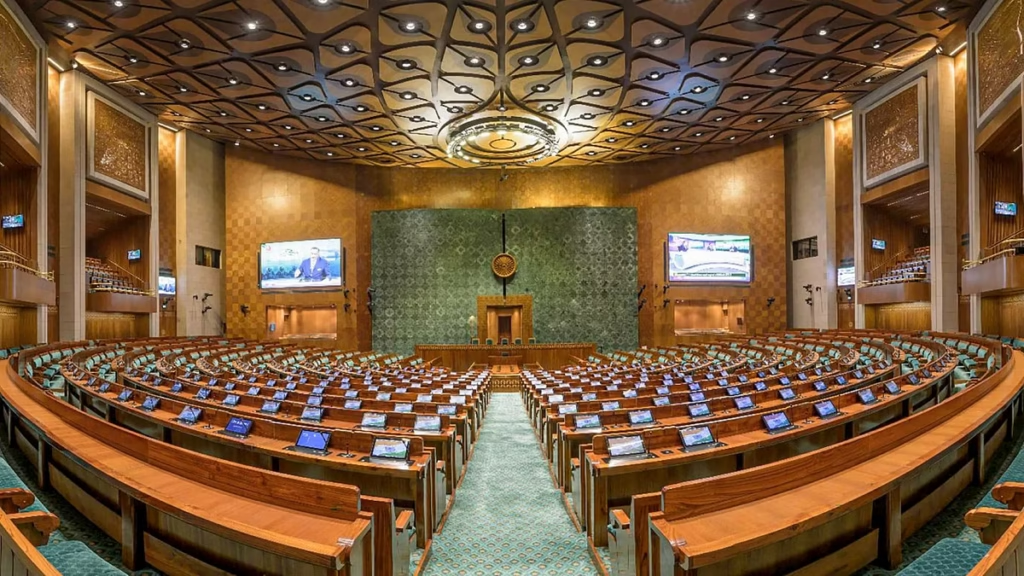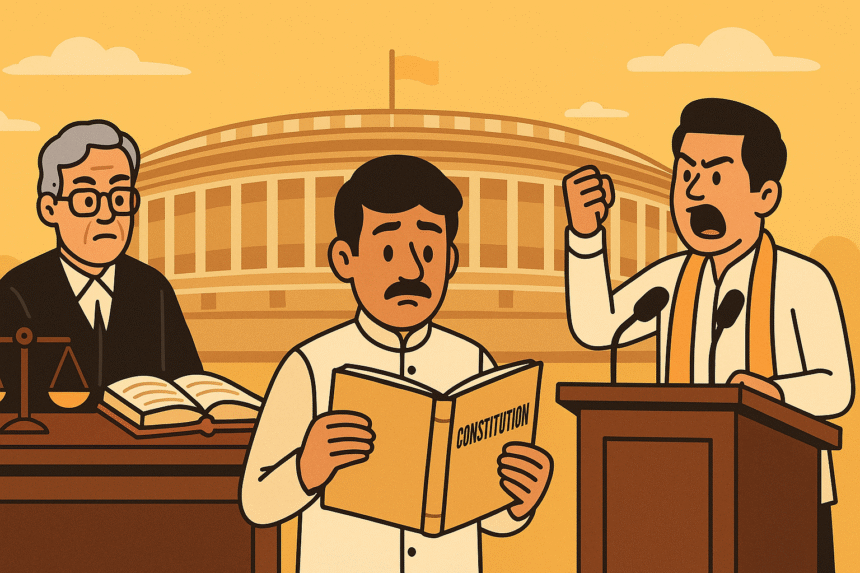Confused about the 130th Amendment Bill? Here’s a simple, witty, and clear explainer that balances humor with facts.
- The Constitution: A Quick Refresher
- So, What Exactly is the 130th Amendment Bill?
- Why Does It Matter?
- The Political Drama (Because What’s News Without Masala?)
- A Look Back: How Many Amendments So Far?
- The Simplified Example (Because Analogies Save Lives)
- Public Reactions (Straight from Chai Tapris and Social Media)
- What Happens Next?
- The Humor-Loaded Recap
- Suggested Related Nokjhok Article
If you thought the Indian Constitution had more stability than your Wi-Fi, think again. Just when you finally understood Article 370 (or at least pretended to in front of your friends), here comes the 130th Amendment Bill—ready to give your brain another legislative workout.
Politicians are debating it in Parliament like it’s the final over of an India–Pakistan match. Arnab is probably already warming up his vocal cords. And the rest of us? We are still Googling—“What is 130th Amendment Bill in simple words?”
Don’t worry, we’ve got you. By the end of this article, you’ll understand it well enough to drop truth bombs in your next chai-stall debate.
(Oh, and if you want the official details, even Navbharat Times is writing about it here.)
The Constitution: A Quick Refresher
Think of the Indian Constitution as India’s rulebook—the OG instruction manual that came into force in 1950.
- It tells us how the government works.
- It protects your rights (like freedom of speech, so you can still tweet about traffic jams).
- It balances power between Centre and States (so Delhi doesn’t boss around everyone too much).
Now, every once in a while, politicians decide that this manual needs updates—like software patches. These are called Amendments.
We’ve had 129 updates already, and now the 130th Amendment Bill is the latest entry.
So, What Exactly is the 130th Amendment Bill?
The 130th Amendment Bill proposes changes to the way certain state powers and central controls function. In short: it’s about balancing who gets to do what—Centre vs. State.
Key Highlights (in plain English):
- State Powers Adjusted – Some areas where states had full control might now involve the Centre.
- Representation Tweaks – Changes in how representatives are elected or appointed in certain bodies.
- Checks & Balances – Strengthening accountability so that power isn’t misused (well, in theory).
If the Constitution were a cricket match, this Bill is basically like changing the fielding rules mid-game. Some are cheering, some are booing, and most of us are wondering why DRS wasn’t applied.
Why Does It Matter?
- For States: It means changes in how much freedom they have in governance.
- For Citizens: It might affect how laws are implemented in your state. Think education, health, local governance.
- For Politicians: It’s another hot potato for them to toss around in debates.
In short, this isn’t just a boring law-class chapter. This has real impact on who gets the bigger slice of the governance pizza.
The Political Drama (Because What’s News Without Masala?)
The ruling party says the Bill is “necessary for stronger national unity”.
The opposition says it’s “an attack on federalism”.
The public says: “Bhai, petrol ka kya?”
If you zoom out, this is classic Indian politics:
- Party A: “We’re fixing the system.”
- Party B: “No, you’re breaking it.”
- Us: “Where’s the popcorn?”
A Look Back: How Many Amendments So Far?
- First Amendment (1951): Added restrictions on free speech.
- 42nd Amendment (1976): Nicknamed the “Mini Constitution” for being so huge.
- 73rd & 74th Amendments: Brought Panchayati Raj and municipalities to life.
Now, the 130th Amendment Bill is ready to join the hall of fame (or infamy—depends who you ask).
The Simplified Example (Because Analogies Save Lives)
Imagine your family WhatsApp group.
- Earlier: Every sibling could post memes freely.
- Now: Parents decide all memes must first be “approved.”
That’s basically what some states are worried about—that their independence could shrink while the Centre gets more say.
Public Reactions (Straight from Chai Tapris and Social Media)
- The Confused Citizen: “130? Bro, I’m still stuck at 370.”
- The Political Nerd: “Well, technically this strengthens the framework of cooperative federalism.”
- The Meme Lord: “New Amendment dropped. Patch notes?”
What Happens Next?
The Bill has to pass through Lok Sabha and Rajya Sabha. Then it goes for Presidential assent. If all goes well, it becomes law.
Till then, expect:
- More fiery TV debates.
- More hashtags on Twitter (sorry, X).
- More chai discussions where everyone pretends to be a constitutional expert.
(Update: After proper uproar in Loksabha (not customary), the Government has sent this bill to Select Committee. Opposition political parties got some relief now.)
The Humor-Loaded Recap
- Constitution = India’s instruction manual.
- Amendments = Software updates.
- 130th Amendment Bill = Big patch with political fireworks.
- Impact = States vs. Centre balance, future governance.
So yes, it’s important, even if it sounds like another boring law.
Forward this before Arnab screams it on TV and makes it sound like a WWE match.
Suggested Related Nokjhok Article
👉 “Parliament’s ‘Holi-day’ Special: When Politics Meets Festive Colors!”













